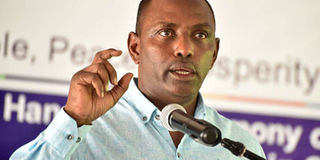Treasury should think outside the box to increase liquidity

Labour and acting National Treasury Cabinet Secretary Ukur Yatani commissions an industrial project funded by South Korea, at the National Industrial Training Authority in Mombasa on November 29, 2019. He needs to be passionate and innovative around the pressing economic issues. PHOTO | FILE | NATION MEDIA GROUP
What you need to know:
- The pending bills problem could emanate from the sharp decline in liquidity-injecting projects in the economy.
- To make matters worse, the Kenya Revenue Authority is sitting on billions of shillings owed to companies in the form of VAT refunds.
I found myself reflecting on what President Kenyatta could do differently and quickly in the first few months of this year.
First, appoint a substantive Cabinet Secretary for finance and planning.
It is disappointing that the body that sits at the apex of the nation’s economic and financial policymaking is, effectively, headless.
I’m not saying that Mr Ukur Yatani does not possess the qualifications and experience to do the job.
It’s just that I think the current leadership of The National Treasury doesn’t have fire in its belly.
The deep thinking and passion to innovate around the pressing economic issues of the day is absent.
Take, for example, the issue of accumulation of pending bills and the impact of delays of contractor payments on liquidity in the marketplace.
PENDING BILLS
We all know that the reason the private sector, and the economy in general, is chocking is because the biggest source of liquidity in the marketplace, the government, has not been releasing payments to its suppliers and contractors.
The parastatal sector, another leading injector of liquidity into the market, is also sitting on massive pending bills. But the biggest culprits when it comes to this are the county governments.
To make matters worse, the Kenya Revenue Authority is sitting on billions of shillings owed to companies in the form of VAT refunds.
When contractors are not being paid, the problem reflects in a spike in the volume of non-performing loans in the banking system.
Admittedly, public finances are in a parlous state and the government cannot just wave a magic wand to clear the pending bills. Worse, revenue collections have fallen behind.
What is lacking at the National Treasury is capacity to experiment and innovate around the pending bills conundrum.
Why is it that the leadership has not moved quickly to evaluate the viability of what their predecessors did in similar situations, including the securitisation option?
SPECIAL BONDS
When the defunct Treasury, then under Dr Chris Obure, found itself in similar circumstances in 2000, the government paid pending bills by issuing special contractor bonds.
Critical voices opposed the minister’s move with questions about verification of the bonds. But, at least, the leadership proved that they could think outside the box.
By issuing the special bonds, the Treasury managed to pay contractors without having to give actual cash.
A similar thing happened in 2008. The National Bank of Kenya was on the brink of collapse due to loans to the tune of Sh21 billion owed to parastatals and all manner of government-initiated debts.
But the Treasury did not have the actual cash to bail it out. The option it adopted was to securitise the liabilities by issuing the bank with Sh21 billion Treasury bonds with varying maturity dates.
I’m not saying that what was done in 2008 must be viable today. It’s just that I don’t see passion and inclination to experiment with new ideas.
When David Mwiraria [he died in 2017] was Finance minister, he was confronted with an economy that had little dynamism.
In 2013, he reduced the cash ratio from eight to six per cent, freeing the liquidity that had been locked up at the Central Bank.
THINK TANKS
The impact was almost immediate. The banking sector found itself with more funds to lend.
And the Treasury bill rate plummeted to almost below one per cent.
Today, the Interior Cabinet Secretary, Dr Fred Matiang’i, chairs the project implementation committee of the Cabinet while his principal secretary, Dr Karanja Kibicho, chairs the technical committee.
When you have a problem with capacity to implement and execute a project on timelines, it makes sense to create a co-ordinating hand with cross-cutting powers and responsibilities across the civil service bureaucracy.
The mindset of bureaucrats is to execute what has been decided elsewhere. They are not trained to think.
The administration of President Mwai Kibaki went around this problem by bringing in the National Economic and Social Council (Nesc).
Nesc had advisers from outside the country, including personalities such as Baroness Lynda Chalker of the UK, Dr Victor Koh of Singapore and Dr KunMo Chung from Korea.
It was the Nesc that developed the much-vaunted Kenya Vision 2030.
TAX EXEMPTIONS
The pending bills problem could emanate from the sharp decline in liquidity-injecting projects in the economy.
Our major infrastructure projects that should inject liquidity into the market are funded by China under arrangements where the billions of shillings lent to us are paid directly to foreign suppliers and contractors.
Since most of the money does not come into the country, the economy does not enjoy the liquidity from these projects.
We have also lost billions of shillings in import taxes as some of these projects enjoy very liberal tax exemptions.



